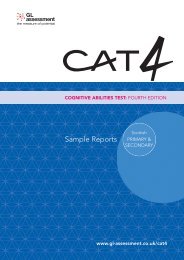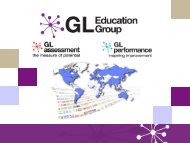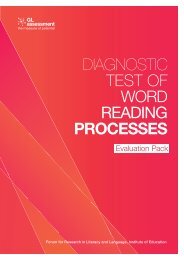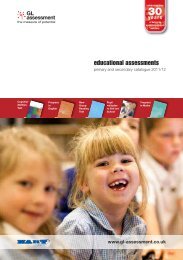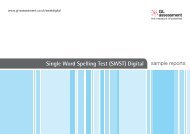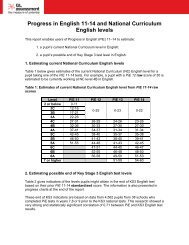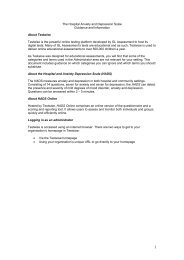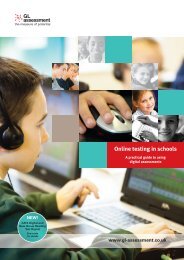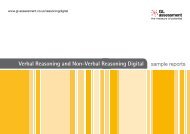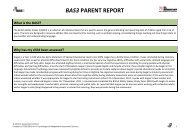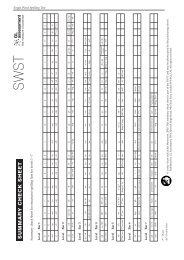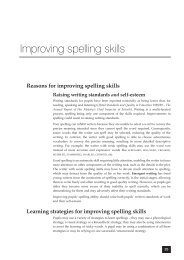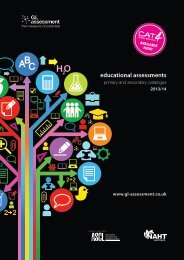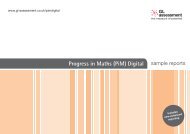educational assessments
quick guide - GL Assessment
quick guide - GL Assessment
- No tags were found...
Create successful ePaper yourself
Turn your PDF publications into a flip-book with our unique Google optimized e-Paper software.
LITERACY<br />
Diagnostic Test of Word Reading Processes<br />
Forum for Research into Language and Literacy, Institute of Education, University of London<br />
quick guide<br />
Age Range:<br />
5–12 years<br />
Suitable for:<br />
Class Teachers, Specialist Teachers<br />
and SENCOs<br />
Administration:<br />
Individual<br />
Timings:<br />
Untimed, 30 minutes approx<br />
With the introduction in 2012 of a mandatory phonics screening test for all<br />
Y1 children in England, the government is rightly emphasising the<br />
importance of phonic knowledge as the foundation of word reading skills.<br />
The Diagnostic Test of Word Reading Processes (DTWRP) goes beyond<br />
this, by giving teachers the opportunity to assess pupils ability to read<br />
words using both phonological and lexical-semantic processes, thus<br />
providing diagnostic information to guide intervention. Because the test is<br />
fully standardised teachers will be able to assess their pupils in the context<br />
of national performance of children between the ages of 5 and 12.<br />
The DTWRP is short and individually administered and contains items that<br />
assess the two sets of word reading processes shown by research to<br />
underlie skilled reading: phonological recoding (through non-words and<br />
regular words); and lexical-semantic (exception words and regular words).<br />
The test contains 30 of each type of word (90 in total), matched on<br />
variables known to influence word reading performance, such as length<br />
and frequency.<br />
Why use the DTWRP?<br />
Readers need to develop two sets of processes:<br />
• Phonological recoding – the automatic conversion of spelling patterns<br />
to sound which is key to reading unfamiliar words and non-words<br />
• Lexical-semantic processing – direct access to the meaning and<br />
pronunciation of familiar words which is key to accurate reading of<br />
irregular words<br />
In combination these two processes enable any word in the language to<br />
be read and understood, regardless of whether it has been seen before.<br />
The DTWRP compares children’s performance on matched sets of regular<br />
and irregular words and non-words.<br />
• The non-words provide a pure measure of phonological recoding<br />
processes<br />
• Irregular words do not conform to the spelling-sound rules of English<br />
and so provide a pure measure of lexical-semantic processes<br />
• Regular words can be read by either process<br />
a complete approach<br />
DTWRP in our portfolio<br />
Our Phonological Assessment Battery (PhAB) (page 37)<br />
is an ideal follow-on assessment for some children tested with<br />
the DTWRP. The DTWRP is designed to benchmark and test<br />
pupils foundation skills in word reading and can be used to<br />
track progress as part of a school’s assessment regime. If<br />
persistent problems are detected then the specialist<br />
teacher/SENCO could administer PhAB.<br />
Did you know?<br />
The Diagnostic Test of Word Reading Processes is<br />
the only test in the UK that assesses regular and<br />
irregular words and non-words and provides<br />
normative data necessary to identify the three<br />
different patterns of difficulty outlined opposite<br />
Therefore, including this test as part of a school’s assessment regime with<br />
children from age 5 to 12, teachers can identify the source of a child’s<br />
reading difficulty whether this is poor phonological recoding, poor lexicalsemantic<br />
processing or a combination of both.<br />
Contents: The Complete Set contains: Manual, Stimulus Card and 50 Record<br />
Forms<br />
Prices<br />
*+VAT<br />
Complete Set 978 07087 20721/GLA500 £100.00*<br />
Record Forms (Pack of 50) 978 07087 20738/GLA500 £36.00*<br />
Find your Area Consultant on pages 4– Tel: 084 602 1937 www.gl-assessment.co.uk<br />
3



